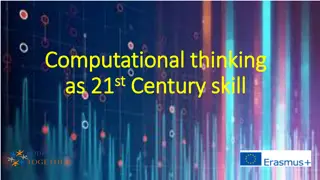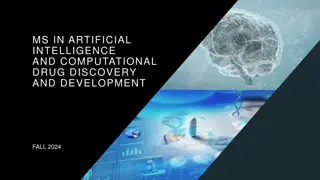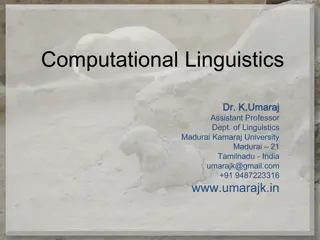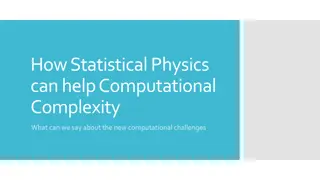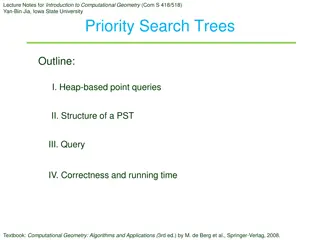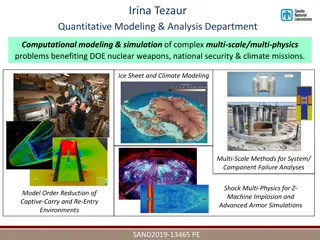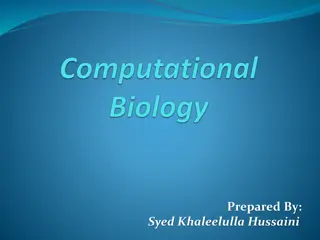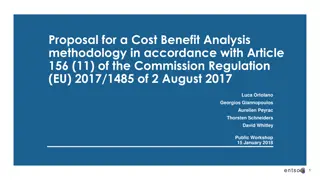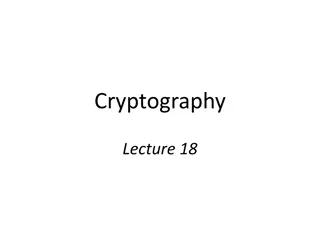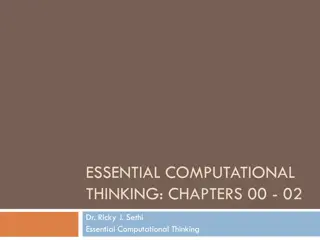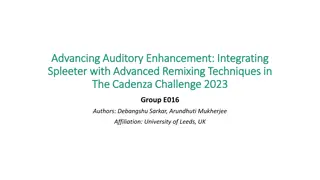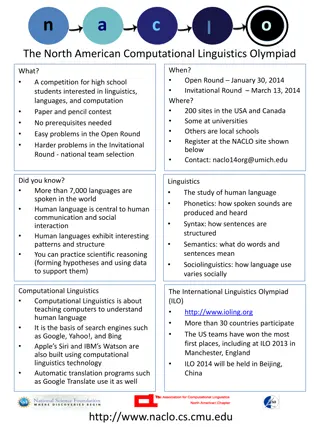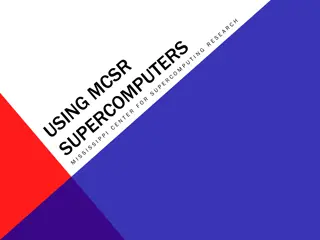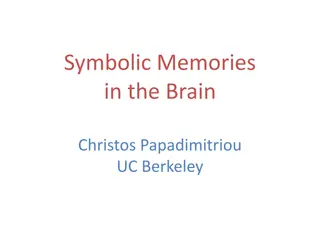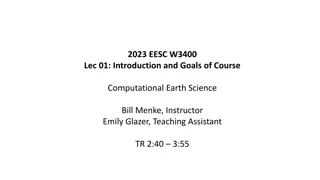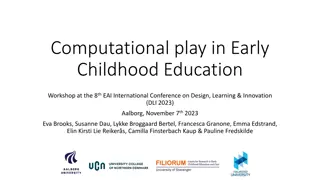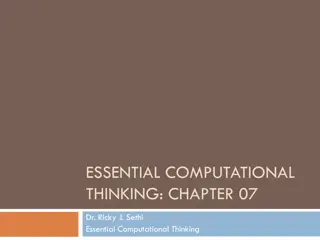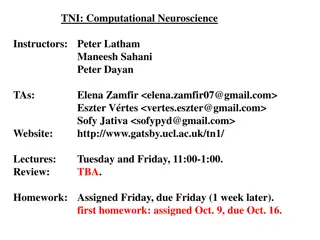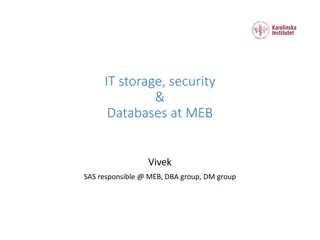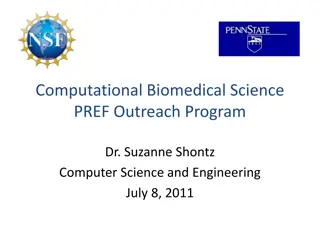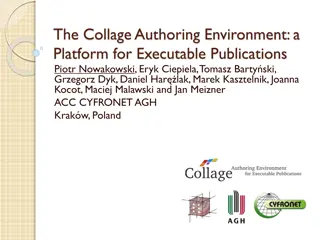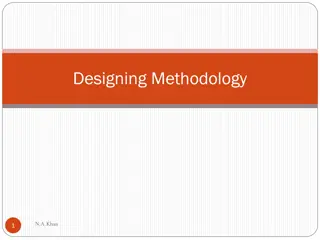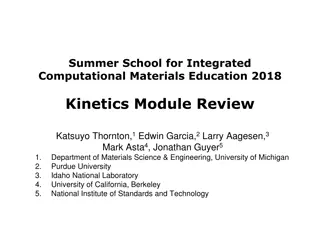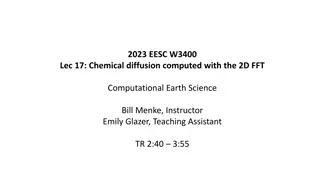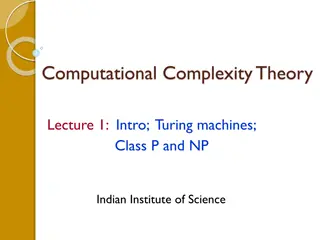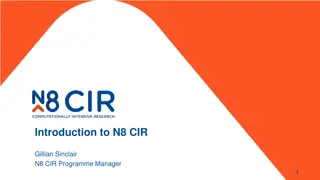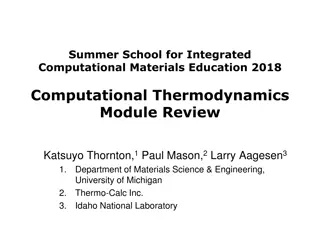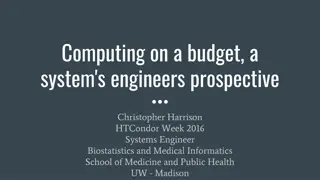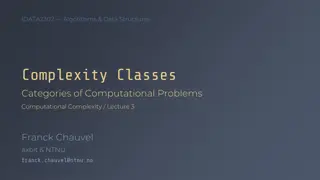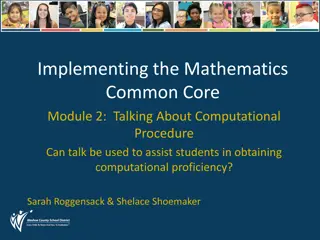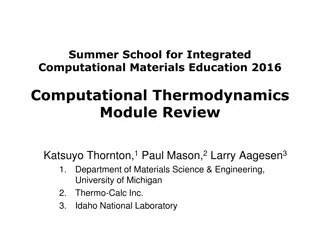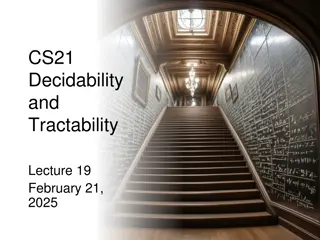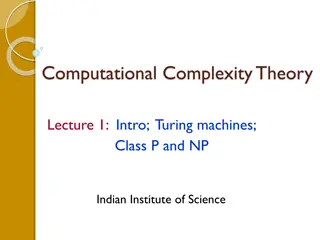Computational thinking as 21st Century skill
Computational thinking is a critical skill for the digital age, involving problem-solving techniques that enable computers to process information effectively. It precedes programming and requires breaking down complex problems into manageable steps. Educators emphasize computational thinking exercis
7 views • 4 slides
Master's Program in Computational Drug Discovery and Development - Fall 2024 Curriculum
This Master's program offers a comprehensive curriculum focusing on Artificial Intelligence, Computational Drug Discovery, and Development. With a blend of cutting-edge technologies and practical applications, students delve into techniques, AI/ML, big data mining, modeling, and more. Through intens
1 views • 7 slides
Computational Linguistics and Natural Language Processing
Explore the fascinating fields of Computational Linguistics and Natural Language Processing (NLP), delving into their development, applications, and significance. Learn about the study of human languages in computational models, the importance of corpora in linguistic research, and the various types
3 views • 33 slides
Computational Complexity Through Statistical Physics
In the age of vast data growth, tackling complex computational problems is crucial. Statistical physics can provide insights into handling the new challenges arising from the exponential increase in data. As we delve into understanding the complexity of computational tasks, it becomes evident that e
1 views • 24 slides
Introduction to Priority Search Trees in Computational Geometry
This lecture outlines the structure and query process of Priority Search Trees (PST) in computational geometry. It covers heap-based point queries, range trees for windowing queries, handling query ranges in 1D and 2D spaces, and using heaps to efficiently handle query ranges. The content discusses
1 views • 18 slides
Advancing Computational Modeling for National Security and Climate Missions
Irina Tezaur leads the Quantitative Modeling & Analysis Department, focusing on computational modeling and simulation of complex multi-scale, multi-physics problems. Her work benefits DOE nuclear weapons, national security, and climate missions. By employing innovative techniques like model order re
2 views • 6 slides
Computational Biology: Proteins, DNA, RNA, Genetics, and Evolution
Computational Biology combines computational methods with molecular biology to solve biological problems. Explore topics like proteins, DNA, RNA, and genetics, learning about amino acids, nucleotides, and the genetic code. Understand the evolutionary processes of mutation and natural selection.
0 views • 21 slides
Cost-Benefit Analysis Methodology as per EU Regulation 2017/1485
This proposal outlines a comprehensive Cost-Benefit Analysis (CBA) methodology in line with Article 156(11) of the Commission Regulation (EU) 2017/1485. The methodology is designed to address the requirements for Frequency Containment Reserve (FCR) and Limited Energy Reservoirs (LER) within the regu
0 views • 64 slides
Introduction to Computational Number Theory in Cryptography
Practical private-key cryptography can be done without advanced math, but understanding computational number theory is essential for public-key encryption. This field focuses on the computational difficulty of problems, analyzing algorithms' running times, classifying problems as easy or hard based
1 views • 27 slides
The Essence of Computer Science and Computational Thinking
Delve into the fundamentals of Computer Science and Computational Thinking through chapters discussing the nature of science, predictions in physics, and the distinction between Computer Science and Computer Information Systems. Explore the relationships between Math, Physics, and Computer Science i
1 views • 29 slides
Advancing Auditory Enhancement: Integrating Spleeter with Advanced Remixing Techniques in The Cadenza Challenge 2023
Our project for The Cadenza Challenge 2023 focused on improving audio for headphone users with hearing loss by integrating Spleeter's deep learning capabilities. We utilized N-ALR prescriptions, Butterworth bandpass filters, and Dynamic Range Compression to enhance audio quality. By leveraging advan
0 views • 19 slides
North American Computational Linguistics Olympiad: A Competition for High School Students
The North American Computational Linguistics Olympiad (NACLO) is a competition for high school students interested in linguistics, languages, and computation. It consists of an Open Round in January and an Invitational Round in March, with no prerequisites needed. Participants tackle easy problems i
0 views • 4 slides
Mississippi Center for Supercomputing Research (MCSR) Overview
The Mississippi Center for Supercomputing Research (MCSR) supports computational research in various fields like Chemistry, Bioinformatics, Physics, Engineering, and Computer Science for Mississippi IHLs. They provide training to optimize computational resources, offer classes for computational trai
1 views • 23 slides
Computational Theories of Brain Function
In this series of images and text snippets, the discussion revolves around the emerging field of computational theories of brain function. Various aspects such as symbolic memories, the relationship between the brain and computation, the emergence of the mind from the brain, and computational thinki
1 views • 53 slides
Computational Earth Science Course Overview
Explore the world of Computational Earth Science with Bill Menke as the instructor and Emily Glazer as the teaching assistant. The course aims to help you become proficient in applying Python-based computational methods to understand dynamic Earth Science phenomena. Through modeling, you will gain i
0 views • 34 slides
Computational Play in Early Childhood Education: DLI 2023 Workshop
The workshop at the 8th EAI International Conference on Design, Learning & Innovation (DLI 2023) in Aalborg aims to delve into the application of computational play with mathematics in early childhood education. Through live sessions and discussions, opportunities and challenges in utilizing computa
0 views • 7 slides
ESSENTIAL COMPUTATIONAL
In Chapter 7 of "Essential Computational Thinking" by Dr. Ricky J. Sethi, dive into procedural programming concepts like sequence, selection, and iteration to craft computational solutions. Explore how engineers approach problem-solving in software development, emphasizing efficiency and abstraction
0 views • 27 slides
Neuroscience at UCL: Computational Brain Insights
Delve into the world of computational neuroscience with instructors Peter Latham, Maneesh Sahani, and Peter Dayan at University College London. Explore the brain's intricacies, from basic facts to mathematical foundations, and uncover the hidden complexities of neural processes. Engage in lectures,
0 views • 98 slides
IT storage, security & Databases at MEB
Responsible for managing data storage, security, and databases at MEB Vivek SAS. The role involves overseeing various server setups, computational servers, home and scratch disk management, and providing access to applications and SQL servers. Additionally, managing computational servers at MEB requ
0 views • 13 slides
Computational Biomedical Science Outreach Program - Overview
Delve into the intersection of computational science and biomedical engineering through the Computational Biomedical Science Outreach Program led by Dr. Suzanne Shontz. Explore the application of computational tools in treating conditions like deep vein thrombosis and hydrocephalus. Learn about the
0 views • 29 slides
Platform for Executable Publications in Modern Computational Science
Computational science faces challenges in publishing large data volumes and complex algorithms. The Collage Authoring Environment offers a solution for validating and sharing executable content within research papers, addressing issues of trust and verifiability in scientific publications. This plat
0 views • 19 slides
Computational Models for Tuberculosis Diagnosis: A Review
This systematic review examines computational models for diagnosing tuberculosis, highlighting strengths, weaknesses, and areas for improvement. The research aims to enhance TB diagnostic accuracy through advanced computational systems.
0 views • 19 slides
Computational geometry introduction
Dive into the fundamentals of computational geometry with this introduction by Rugaia Omer Ahmed. Explore key concepts, algorithms, and applications in the field. Gain insights into geometric computations and problem-solving techniques. Enhance your understanding of spatial data structures and geome
0 views • 15 slides
Mastering Computational Geometry: Problem-Solving Strategies
Explore the world of computational geometry through practical problems like finding the closest pair of points in a 2D plane. Delve into the divide and conquer approach to efficiently solve complex geometric challenges. Uncover insights on organizing points, sorting by x-values, and handling proximi
0 views • 25 slides
2018 Residential Rate Methodology Overview
The 2018 Residential Rate Methodology introduces a new approach for determining care and supervision rates for residential placements. The timeline, benefits, key elements, and transition planning are explained. Considerations such as rate transparency, acuity bands, and outcome goals drive rate enh
0 views • 20 slides
Research Methodology: The Science of Systematic Problem Solving
Research methodology is essential for researchers to develop a systematic approach to solving research problems. It involves understanding various research methods and techniques to make informed decisions. Through research methodology, researchers can evaluate the relevance of different methods and
0 views • 43 slides
Computational Materials Education: Kinetics Module Review
Dive into the Kinetics Module of the Summer School for Integrated Computational Materials Education 2018, exploring diffusion, semiconductor processing, computational tools, and more. Understand the driving forces behind diffusion and Fick's laws, with hands-on exercises and analytical solutions to
0 views • 20 slides
Understanding Chemical Diffusion Using Fast Fourier Transform
Explore the computational analysis of chemical diffusion through the application of the 2D FFT method in Computational Earth Science. Learn about variables, conservation of mass principles, and the computational procedures involved in studying chemical diffusion. Discover the correlation between low
0 views • 33 slides
Introduction to Computational Complexity Theory at Indian Institute of Science
Learn about computational complexity theory, Turing machines, P and NP classes, and various types of computational problems such as decision, search, counting, and optimization. Explore how algorithms and formal models of computation are used to solve complex problems efficiently.
0 views • 112 slides
Understanding Computational Complexity: Theory Lectures and Problem Classification
Dive into Computational Complexity Theory with this lecture series by the Indian Institute of Science. Explore the fundamentals of Turing machines, Class P and NP problems, and the classification of computational problems based on resources required. Learn about decision, search, counting, and optim
0 views • 79 slides
N8 CIR Research Partnership: Advancing Computational Intensive Research
N8 CIR, a collaboration of 8 research-intensive universities in the North of England, aims to develop skills, facilitate access to computational resources, and accelerate research through practitioner-led approaches. The program focuses on various themes including Digital Health, Digital Humanities,
0 views • 7 slides
Introduction to Computational Sciences - A Visual Journey
Explore the world of Computational Sciences through visually engaging slides covering various key aspects and topics. From basics to advanced concepts, embark on a learning adventure in computational sciences.
0 views • 12 slides
Computational Thermodynamics Module Review - Summer School 2018
Explore the Computational Thermodynamics Module at the Summer School for Integrated Computational Materials Education in 2018. Dive deep into thermodynamic concepts, phase equilibrium, and the application of computational tools in real-world engineering problems. Gain insights into Gibbs Free Energy
0 views • 14 slides
Challenges Faced in Budget Computing: Solutions and Strategies
Explore the world of budget computing with Christopher Harrison as he delves into the challenges of system engineering, collaboration with developers, computational job profiling, and more. Discover how users are solving problems, dealing with computational challenges in biostatistics, and thinking
0 views • 9 slides
Computational Complexity and Decision Problems Overview
Explore the world of computational complexity, decision problems, and algorithm efficiency with insights into various complexity classes and computational models. Understand how decision problems can be framed as yes or no questions and delve into examples like the Traveling Salesperson Problem. Dis
0 views • 23 slides
Enhancing Mathematics Learning Through Productive Talk on Computational Procedures
Explore how classroom discussions can assist students in acquiring computational proficiency by building connections between procedures and concepts, using computational skills as problem-solving tools, and deepening reasoning through productive talk strategies.
0 views • 24 slides
Understanding Spiking Neural Networks: From Modeling to Computational Challenges
Explore the world of spiking neural networks through various aspects such as modeling spiking neurons, neural network structure, computational problems, and the role of randomness in breaking symmetry. Dive into topics like neuro- RAM units, analysis of neural networks, and the implications of rando
0 views • 28 slides
Integrated Computational Materials Education: Thermodynamics Module Review
Explore the Computational Thermodynamics module from the Summer School for Integrated Computational Materials Education 2016, covering Gibbs Free Energy, Phase Equilibrium, and Chemical Equilibrium concepts. Enhance your understanding with hands-on exercises and real-world engineering applications.
0 views • 14 slides
Understanding Complexity Classes and Computational Hardness
Explore the concepts of decidability, tractability, hardness, and completeness in computational theory. Discover how problems can be transformed, languages can be defined, and complexity classes can be analyzed to determine the difficulty of computational tasks. Dive into the realm of EXP-complete p
0 views • 40 slides
Understanding Computational Complexity Theory: Intro to P and NP
Dive into computational complexity theory exploring topics like Turing machines, Class P and NP, decision problems, search problems, counting problems, and optimization problems, all aimed at classifying computational problems based on required resources. Discover the essence of algorithms and their
0 views • 105 slides
